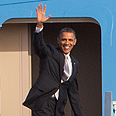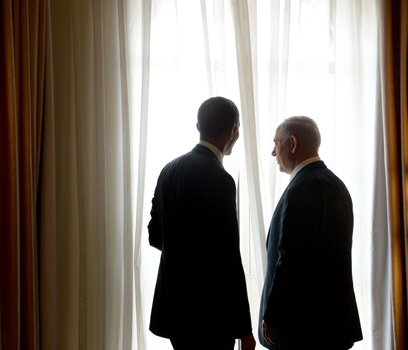

Even more significantly, he left – at least seemingly – our freedom, our fate and our future in our hands. Indeed, it is limited freedom, under the watchful eye, tight lips and demanding force of the American authority – and yet, the permission is given and the choice is free.
Sound ideal? Not when it comes to us. Obama's appeal to the "people" in his speech, "over the leaders' heads," calling for a public striving for peace, was a desperate move more than anything, as it is clear to the US president that he has nothing to gain from the current Israeli leadership. Moreover, despite the fundamental preparation work ahead of the visit, the popular Obama appeal may have reflected lack of familiarity with that "people."

Obama with PM Netanyahu (Photo: Avi Ohayon, GPO)
We, as opposed to the distinguished guest, know our people – ourselves – very well. And the bitter truth is that for years – perhaps since the days of the protest against the first Lebanon War – we have neither been leading political moves nor forcing our leaders to carry them out. Even the single move which was sort of led by the "people" – the social protest – was dropped and abandoned at the moment of truth, in the elections.
Talking "tachles," as our brother should be taught to say in our language ahead of his next visit, the Israeli public is indifferent, conservative, not daring, and excels in passing the time somehow with minimum disorder. As opposed to the prevailing opinion which we are so fond of, this public is not smarter than its leaders. And as the Hebrew song goes: The public is stupid, and so the public will pay.
Scolding from our good uncle in America is not the thing that will convince us to change our outlook, our way, our reality. This is not what may move us towards the end of the occupation, the evacuation of settlements and an Israeli-Palestinian peace agreement. All that can happen, Heaven forbid, through an American ultimatum with practical repercussions – a budgetary gun to the head, an existential economic threat. Or more likely and as cruel – through another such intifada, which will stir us up and force a change, as the first Intifada did at the time. Let's admit it: Until things don't go up in flames, bleed and hurt – we won't budge. That's the way we are. And perhaps it's not just us; perhaps it's just human nature.
Since the exodus from Egypt, when we showed the leader of the superpower of the ancient world who's boss, we have nothing more important than our freedom. We love our freedom, even if it is somewhat imaginary, almost as much as we love ourselves and love to kill those who hate us. We love our freedom more than we love international stars who visit us, give us the time of day and pretend to speak our language.
So there is no doubt that we love freedom, but do we understand it? One thing is certain (although we've always attributed that to the Arabs) – we understand force much more. We're a stubborn people, after all.















